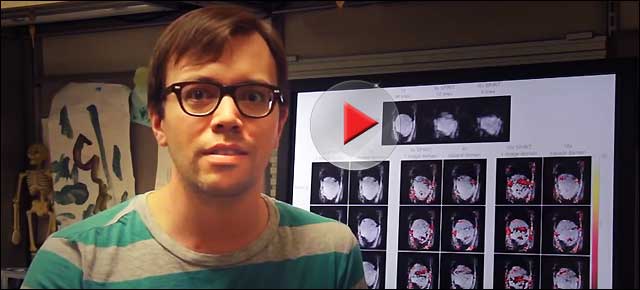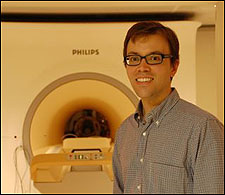
“I live for the problems we get to solve,” says Will Grissom, assistant professor of biomedical engineering, radiology and electrical engineering. The problems Grissom refers to revolve around magnetic resonance imaging – helping clinicians see inside the human body, discovering new ways to target diseases and creating more effective and efficient health care solutions.
Self-described as “OK” in math and science, Grissom gravitated toward liberal arts early in his undergraduate studies, and he originally planned to study law. However, a lingering interest in programming led him to take a few classes in electrical engineering. Those classes led to an internship that gave Grissom hands-on experience and inspired him to commit to engineering.
“The first couple of years were really hard,” Grissom said. “It was hard to see where the applications were. Once I got an internship in the area, I started to get really excited about it and decided to stick it out in a technical discipline. A lot of my motivation is just the nerdy desire to solve the problem.”
That internship and others played a critical role in shaping Grissom’s career. After committing to engineering, another internship introduced him to the field of imaging. In his senior year of undergraduate studies, Grissom began working on a project in functional brain imaging with a professor at the University of Michigan. After graduation, he took a position working in that professor’s lab as a graduate student.
After earning a Ph.D. from Michigan, Grissom spent time at Stanford University as a postdoc and as a researcher at General Electric Global Research in Munich, Germany, where he collaborated with researchers at Stanford University and a GE spin-off. There, he was part of a team that developed a new way to estimate temperature images from MRI data that was significantly more robust than previous methods.
Grissom joined the School of Engineering as an assistant professor in 2011. He is a member of the core faculty of the Vanderbilt University Institute of Imaging Science (VUIIS).

This month he received a two-year, $419,000 award – “RF Encoding for Gradient-Free MRI” – from the National Institute of Biomedical Imaging and Bioengineering (NIBIB), one of the 26 National Institutes of Health. The goal of this project is to develop new radiofrequency (RF) gradient encoding methods to spatially encode signals in MRI. The methods would enable silent, low-cost MRI systems, leading to a substantial drop in the cost of imaging and improved patient comfort.
Earlier this year, Grissom received a four-year, $1.4 million grant – “Three-Dimensional Patient-Tailored RF Pulses for Spin Echo Neuroimaging at 7 Tesla” – also from NIBIB. As principal investigator, Grissom and his co-investigators, biomedical engineering professor Adam Anderson and Radiology professors Seth Smith and Manus Donahue at Vanderbilt and Fernando Boada, a professor at New York University, aim to develop new technical approaches to brain imaging using VUIIS’ 7-Tesla ultra-high-field magnetic resonance imaging (MRI) scanner.
7-Tesla MRI promises to deliver substantially clearer images of body structure and function than are currently possible, but there are a few engineering hurdles that must be overcome before it can achieve broad clinical impact. Grissom’s project directly addresses one of those hurdles.
Also, in the spring Grissom was awarded a Focused Ultrasound Foundation External Research Award for research that builds off his early work as a post-doc at Stanford and a research engineer at GE.
“The Foundation is directly engaged in engineering and clinical trials to get focused ultrasound off the ground in the clinic,” said Grissom. “I’ve mostly been working with them on brain applications, trying to find safer and more effective methods for ultrasound surgery in the brain. This grant will allow us to perform experiments in collaboration with the University of Virginia – utilizing their brain MR-guided focused ultrasound system but implementing our software tools.”
“A lot of my motivation is just the nerdy desire to solve the problem,” said Grissom. “That’s what makes me work on this every single day, but ultimately our goal is to improve overall health care delivery, health care effectiveness, and health care value.”
Contact:
Brenda Ellis, (615) 343-6314
Brenda.Ellis@Vanderbilt.edu
Twitter @VUEngineering